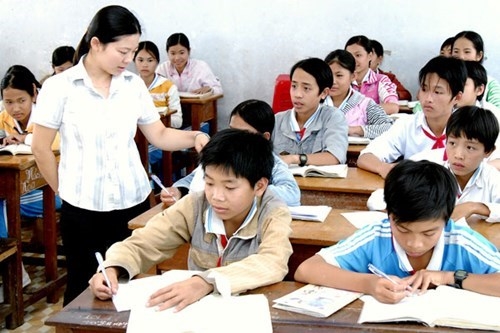 Society
Society

The Deputy Minister of Education and Training yesterday urged vocational training schools to renew curricula and methodology to help improve employee skills at industrial parks and export processing zones.
 |
HCM CITY— The Ministry of Education and Training yesterday urged vocational training schools to renew curricula and methodology to help improve employee skills at industrial parks (IPs) and export processing zones (EPZs).
Speaking at a workshop held in HCM City, deputy minister of Education and Training Bùi Văn Ga said that 80 per cent of the 2.6 million employees at IPs and EPZs nationwide lacked professional skills.
He noted that more manual labourers would be replaced by robots in the future.
“Global integration and the movement of Vietnamese labourers to other countries and foreigners to Việt Nam because of the ASEAN Economic Community and international trade agreements, requires schools to renew curricula and methodology for a new age,” he said.
Schools should take the initiative and work with enterprises in developing new training models and renewing curricula, he said.
Ga said the number of students who chose not to sit university entrance exams and apply for vocational training schools this year increased by 5 per cent compared to last year.
Last year, there were 304 industrial parks, compared to only one in 1991.
IPs have attracted 8,500 domestic and foreign projects worth around US$70 billion, of which more than $52 billion contributes to more than 30 per cent of the country’s total industrial value.
They bring much-needed infrastructure such as roads and electricity and water systems.
More than 14 economic zones exist in the country, attracting 320 foreign direct investment projects worth $40 billion and 890 domestic projects worth VNĐ560 trillion ($24 billion).
Training scale
As of 2015, the country had 1,467 private and public vocational training schools and more than 1,000 establishments with vocational training courses, a 3.5-fold increase compared to 2010.
Of these, 45 public schools have been selected to give priority to invest in high-quality vocational training in 2020.
The number of students attending vocational schools increased by 18 per cent within the 2011-15 period compared to the 2006-12 period.
The total number of students from 2011 to 2015 was 9.2 million, raising the proportion of trained labourers by 18.5 per cent compared to 2010.
The number of graduates from vocational training schools getting jobs was about 70 per cent last year.
Training majors with a high number of graduates getting jobs soon after graduation include hospitality, fashion, pharmaceutical technician and others.
According to reports from the city’s Department of Labour, Invalids and Social Affairs, the average salary of new graduates from vocational training schools is VNĐ3 million –VNĐ3.5 million ($130 - $150) per month. — VNS




